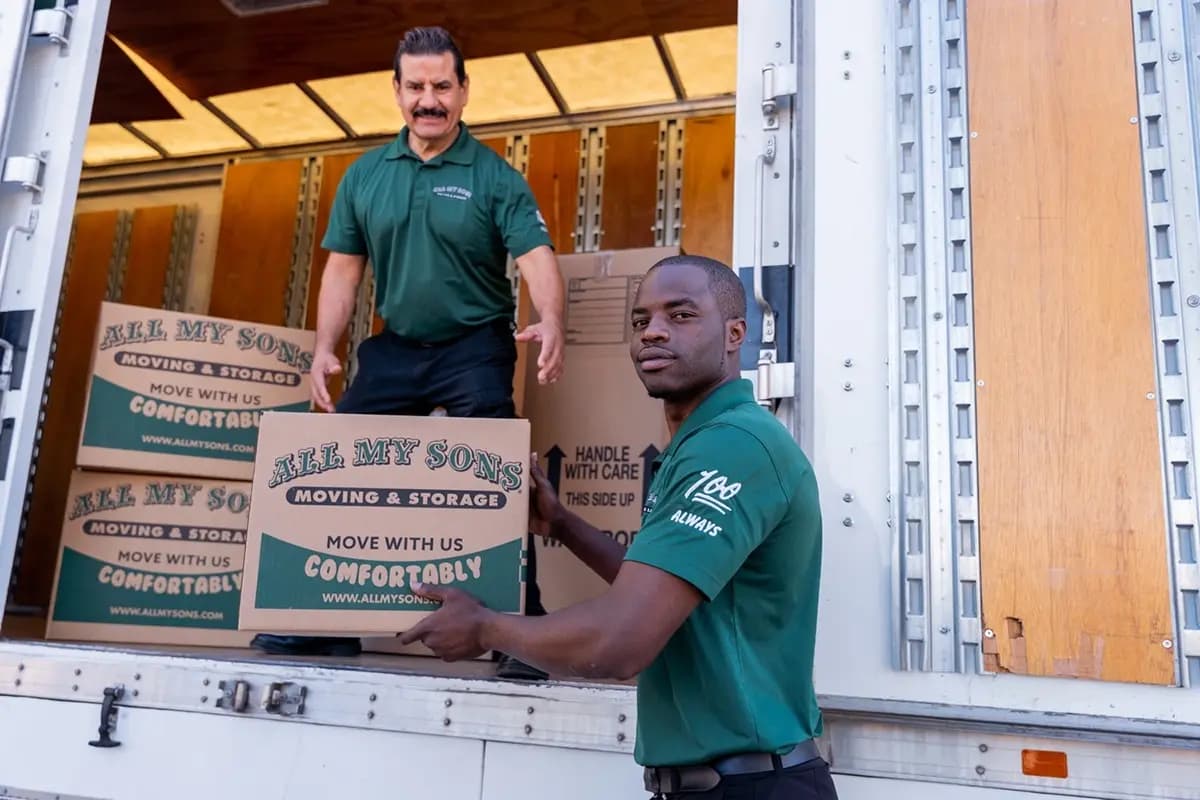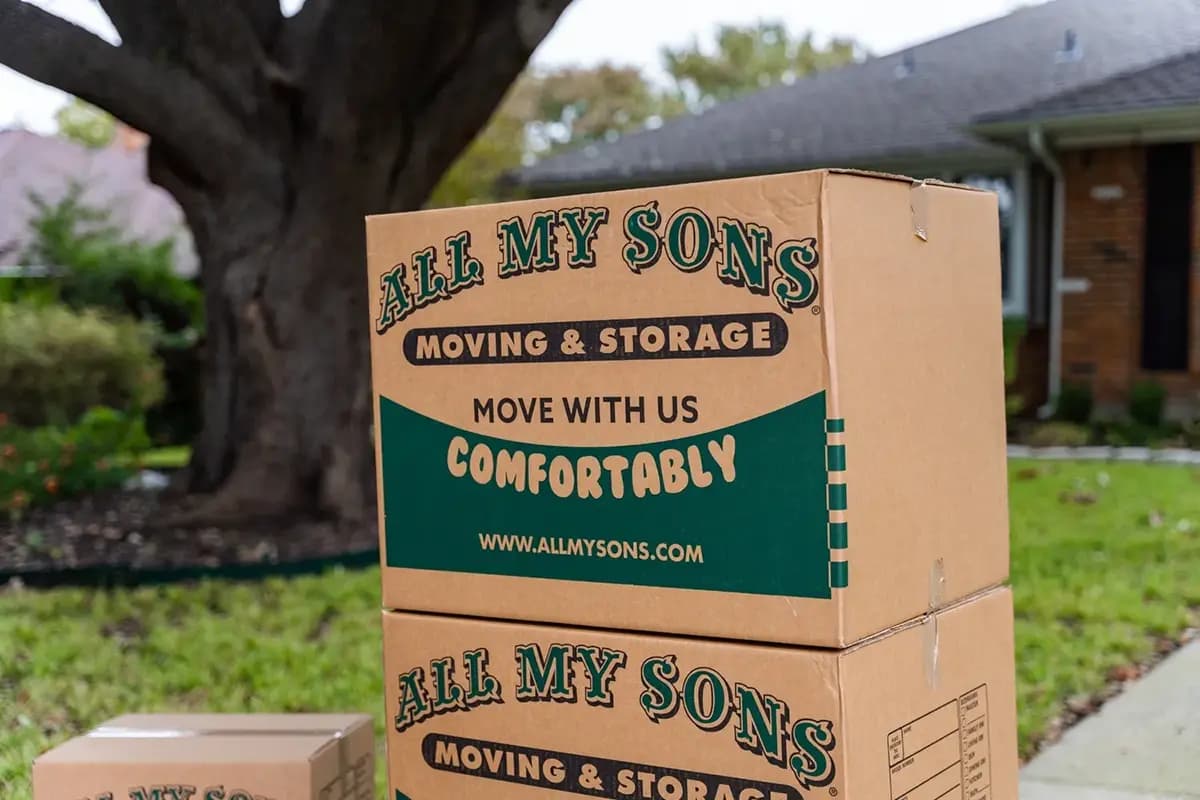Care for the Planet During Your Move
All My Sons Moving & Storage offers advice on how to make your local move more eco-friendly.
Between getting rid of unwanted items, throwing away packing material, and the emissions made by trucks, moving can produce a lot of harmful waste for the environment. Combine that over the roughly 28 million people relocating in America every year and the moving industry has the potential to make a serious impact on the planet. If you’re an environmentally conscious person, you might be wondering what you can do during your individual move to be kinder to the Earth.
At All My Sons Moving & Storage we understand that moving can be a chaotic and stressful time. Our goal in creating these guides is to empower our customers with tips and tricks from the moving professionals. Keeping the planet healthy might be low on your moving checklist, but when we all do our part then we are capable of making a lasting difference.
When you’re making your move, be sure to keep these tips in mind and move greener.
Tip 1: Plan Your Move Ahead of Time
An unorganized move is an inefficient move. If you’re scrambling to throw your move together then you’re likely to make mistakes that prove wasteful. Nix the chaos before it happens by planning your move well in advance. Create a detailed moving checklist, determine what your essentials are, and look for places where you can make the more sustainable choice. Even if you’re moving last-minute, a little extra planning can make a huge difference. With some forethought, you can make fewer trips in your gas-guzzling truck, pack all your belongings effectively, and properly donate and dispose of your unwanted items.
While you’re planning ahead, review your household moving inventory. Determine the items you want to move with you that will require extra protection and care. It’s possible you can cut down on the amount of packing material you consume during your move by using your own towels and clothes to wrap fragile items. When packing room-by-room, fill empty space in your boxes with lighter items from the same room instead of packing paper, peanuts, or bubble wrap.
Tip 2: Donate What You Declutter
Reduce, reuse, and recycle is the mantra of the eco-friendly game. While you’re downsizing and decluttering prior to your move, note the condition of the items that you intend to offload. Some things you decide to get rid of might be in good shape, and it would be wasteful to just throw them out. If you don’t intend to sell these items, then make sure they find a good home by donating them.
Charities like Goodwill and the Salvation Army accept donations of clothing, furniture, and household goods all over the country. If you’re interested in supporting your local community, you can likely find nonprofits and charities that operate solely in your area. Some of these organizations will pick up your items for free. Your items will get a second life with someone in need. You can also offer your items for free on local buy-nothing groups or Freecycle and have some say and control over who gets your item.
When your move involves emptying your fridge, find a local food pantry to donate your still-consumable food items to rather than throwing them out. If items are open or partially consumed, then ask family or friends if they want any before you throw them out completely.
Tip 3: Use Eco-Friendly Packing Materials
When you are not able to use your own soft items like clothes, pillows, and towels to pack your boxes, then choose the environmentally friendly options for packing material. Look for material that is biodegradable, made from sustainably sourced material, or even reusable.
Reusable Plastic Bins: Plastic bins are a durable alternative to cardboard boxes. They can be used for multiple moves and do not require tape to seal or box cutters to open. You can purchase plastic bins for yourself at many online retailers or department stores. If you don’t intend to keep the plastic bins on hand, you can rent plastic bins from a variety of moving supply companies including Stack, ReBox, and Uhaul.
Biodegradable Packing Peanuts: Typically made from natural starches, biodegradable packing peanuts should break down in water without leaving any harmful residue. Regular Styrofoam peanuts can take up to 500 years to decompose in a landfill. Biodegradable packing peanuts can be left in a compost bin and gone within days.
Honeycomb Paper: A lightweight material with excellent shock absorption, Honeycomb paper is a more environmentally-conscious alternative to bubble wrap. As it is paper, Honeycomb paper is recycled easily. Bubble wrap can be recycled, but it is more difficult and large quantities of bubble wrap wind up in landfills as a result.
Paper Tape or Water-Activated Tape: If non-reinforced water activated tape will meet your needs, it is both biodegradable and recyclable. This tape is easy to tear and write on, which may be beneficial during your move.
With some careful forethought and research, you can choose better options for packing up your belongings. This will cut down on the waste your move produces.
Tip 4: Reuse Moving Boxes
Moving boxes are usually good for one than one move. Instead of buying brand-new packing supplies, try asking family, friends, and neighbors if they have moving boxes or other moving supplies you can use. If no one in your immediate network has available moving supplies, you still might be able to find listings on local neighborhood social media groups. Craigslist, Facebook Marketplace, and Nextdoor are also great places to find people offering their old moving boxes for free or cheap.
Asking around town at local businesses is worth a shot too. Your local restaurants, grocery stores, liquor stores, bookstores, bars, coffee shops, and libraries might get deliveries in boxes that they’d be happy to give to you. Just be sure to talk to a manager and get permission to take boxes. The box gets saved from the garbage, the business saves dumpster space, and you get a free box, it’s a win for you, the business, and the environment.
You can also save boxes from deliveries made to your home or office space. Just remember to inspect your boxes before you load them with items and make sure they are still in good condition. Don’t use boxes that are ripped, water-damaged, or smelly. You still need these boxes to hold up well during your move or survive an extended period of time in storage if you’re planning on using a storage unit for your move.
Tip 5: Use Eco-Friendly Cleaning Products
When you finish loading your truck, you should clean your previous place thoroughly for the next tenants or your landlord. Household cleaning products often contain harsh chemicals that aren’t good for the environment, or human health. Instead of using a regular household cleaning product for your move, why not try a more environmentally conscious option?
You can make your counters shine with just white vinegar, an old T-shirt, and some elbow grease. Baking soda and borax also have natural cleaning power. You can add some essential oils to your natural cleaning mixtures for a fresh scent.
For anyone looking for stronger cleaning products, the United States Environmental Protection Agency has a database of Safer Choice products and disinfectants and sanitizers that are Design for the Environment (DfE) certified. Products that attain this certification are qualified to display the special DfE logo on their label.
Tip 6: Recycle Your Moving Supplies When Done
When your moving boxes are still in great condition, then you can pay it forward in your community by offering the boxes to friends, family, or neighbors. You can gift the boxes to someone directly or list them on a local group for buy-nothing, Craigslist, Facebook Marketplace, or Nextdoor. Your boxes will take off into the sunset to perform another big move, steering clear of the landfill and cutting down on the amount of waste your move produces.
If your moving boxes are damaged or otherwise do not have another move in them, break them down and have them properly recycled. According to the American Forest & Paper Association, a cardboard box can be recycled up to seven times. Just make sure your boxes are clean, dry, and flattened. Put the boxes in your household recycling bin or take them to a local recycling collection center. Packing paper is also easily recycled. As long as the paper is clean and dry, you can drop it in your household recycling bin.
Bubble wrap is recyclable, but not with your regular curbside bin. It needs to be recycled with other plastic films like grocery bags. If your local grocery store does plastic bag recycle then they can likely take your bubble wrap too.
Ready to Make an Eco-Friendly Move
With a little extra thought and planning, you can make your move in a way that keeps the planet happier. While small changes like wrapping your breakable items in towels and gifting your boxes to someone else when you’re done moving might not seem like much, imagine if all 28 million people relocating every year thought to do similar things. Collectively, we could save tons of waste from going into landfills and reduce our overall carbon footprint.
Now that you’re planning ahead to make your move greener, it’s time to check off the next important item on your moving checklist: Book your movers. You can make your move with less anxiety by choosing the trustworthy relocation experts serving more than 90 locations across the United States. All My Sons Moving & Storage can make your local, long-distance, or commercial move. We offer comprehensive moving services including professional packing, auto-transport, and storage unit rentals. We’ve been in the business of helping companies and families make their big move for almost 30 years, and we would be proud to bring our extensive expertise and customer-focused care to your move. Call your local All My Sons Moving & Storage location or get started with an online quote to get ready for your move.
Quick Moving Tips

How to Pack an Electric Piano for a Move
Will you be moving your electronic piano yourself? Here are five steps to help get the electric piano transported safely to your new home.

How to Store Electronics Long-Term
Fun tech like your computer, television, gaming system, and all manner of battery-operated devices need some extra care when going into long-term storage.

Beginning Moving Tasks Checklist
Take a deep breath and start with the basics. Here are five tasks to complete when you learn you are moving.


